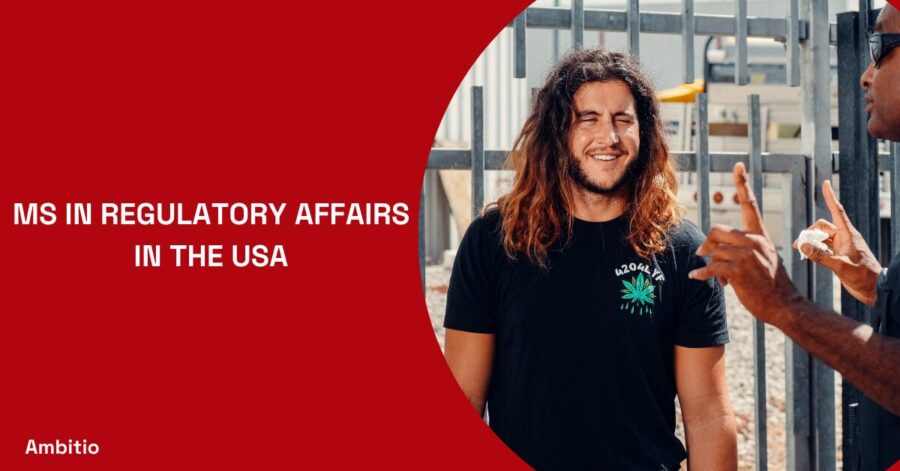12 December 2024
7 minutes read
MS in Regulatory Affairs in the USA

Key Takeaways:
- Comprehensive curriculum in regulatory affairs programs.
- Pursue an MS for advanced knowledge in the field.
- Programs offer industry connections and practical exposure.
- Professional development is integral to student success.
- Graduates excel in the pharmaceutical and medical device sectors.
Embarking on a career in regulatory affairs demands a solid educational foundation, especially in a landscape as dynamic and stringent as the United States.
Whether you’re aspiring to shape the future of pharmaceuticals, medical devices, or healthcare products, selecting the right regulatory affairs program is crucial.
This guide delves into the esteemed universities in the USA offering programs designed to mold the next generation of regulatory professionals, providing a student-friendly environment that fosters professional and personal development.
Understanding the Master of Science in Regulatory Affairs

A Master’s in Regulatory Affairs is a specialized program designed to provide students with a comprehensive understanding of the laws, regulations, and guidelines that govern the pharmaceutical, medical device, and biotechnology industries.
It combines elements of science, law, and policy, empowering students to ensure that products meet the necessary safety and efficacy standards before they reach the market.
- Interdisciplinary Education: The program integrates science, law, and policy, offering a holistic view of the regulatory landscape.
- Critical Skills Development: Students develop critical thinking, problem-solving, and communication skills, essential for success in the regulatory field.
Key Components of the Regulatory Science Program
- Regulatory Science: Understand the fundamental principles of regulatory science, crucial for navigating the regulatory landscape.
- Pharmaceutical and Medical Device Regulations: Dive deep into the regulations specific to pharmaceuticals and medical devices, ensuring product safety and compliance.
- Compliance Strategies: Learn how to develop and implement strategies to maintain compliance with regulatory requirements.
- Ethical Considerations: Explore the ethical aspects of drug development and marketing, emphasizing patient safety and product integrity.
Benefits of Pursuing an MS in Regulatory Science Program in the USA
Studying in the USA offers unique advantages for students in regulatory affairs:
- Access to Leading Institutions: The USA boasts some of the top universities and colleges of pharmacy, offering cutting-edge regulatory science programs.
- Proximity to Industry Leaders: Doing masters in the USA provides close access to major pharmaceutical companies and regulatory bodies like the FDA.
Admission Criteria for MS in Regulatory Science at Leading USA Universities
Prospective students must meet specific criteria to be considered for admission:
- Educational Background: A bachelor’s degree in a related field is essential for foundational knowledge.
- Professional Recommendations: Letters of recommendation attest to the candidate’s abilities and potential in the field.
- Personal Statement: A statement of purpose provides insight into the student’s motivations and career objectives.
Required Documents for International Students
International students must submit additional documentation for admission:
- Academic Transcripts: Evidence of completed undergraduate studies.
- Language Proficiency: TOEFL or IELTS scores to demonstrate English proficiency.
- Supporting Documentation: Additional items like resumes may be required to highlight the applicant’s experiences and achievements.
Confused about document requirements while applying for colleges in the USA?
Read this article: Documents required for MS in the USA
Quick Tips:
- Research Thoroughly: Investigate each program’s curriculum and industry connections to find the one that aligns with your career goals.
- Seek Practical Exposure: Opt for programs that offer real-world case studies and industry projects to apply your knowledge.
- Focus on Development: Choose programs that emphasize professional and personal growth to enhance your career prospects.
Importance of Work Experience for MS in Pharmaceutical Regulatory Affairs Enrollment
While not a universal requirement, relevant experience in the pharmaceutical, biotech, or healthcare sectors can significantly strengthen an application.
Unlock Personalized College Application Guidance: “Don’t navigate the admissions maze alone. Book a session with our expert mentor for personalized advice tailored to your needs. Choose your preferred date and time now!
Growing Demand: The regulatory affairs field is expanding rapidly, with increasing demand for professionals who can navigate the regulatory landscape for healthcare products (Source: Bureau of Labor Statistics).
Timeframe for Completing an MS in Regulatory Science in the USA
- Program Duration: Typically, the program spans 1-2 years, influenced by whether the student opts for full-time or part-time study.
- Flexible Learning Options: Many institutions provide flexible schedules to accommodate professionals who are continuing their education.
Job Opportunities for Graduates in Regulatory Affairs
| Job Title | Industry | Key Responsibilities | Required Skills | Potential Employers |
|---|---|---|---|---|
| Regulatory Affairs Specialist | Pharmaceuticals | Ensure compliance with regulatory guidelines, prepare submission documents for new drugs. | Attention to detail, knowledge of regulations | Pharmaceutical companies |
| Compliance Officer | Biotechnology | Monitor and audit internal processes to ensure compliance, advise on regulations. | Analytical skills, understanding of biotech regulations | Biotech firms |
| Regulatory Strategy Manager | Medical Devices | Develop and implement strategies for regulatory approval of medical devices. | Strategic planning, regulatory knowledge | Medical device manufacturers |
| Clinical Trials Manager | Healthcare | Oversee clinical trial processes, ensure adherence to regulatory and ethical standards. | Organizational skills, knowledge of clinical trial regulations | Hospitals, research institutions |
| Regulatory Affairs Consultant | Consultancy | Provide expert advice on regulatory strategies, compliance issues. | Expertise in regulatory affairs, communication skills | Consultancy firms |
| Product Development Manager | Food Safety | Develop new products, ensuring they meet all regulatory and safety standards. | Innovation, knowledge of food regulations | Food and beverage companies |
| Quality Assurance Manager | Diagnostics | Ensure that diagnostic products meet regulatory and quality standards. | Quality control, regulatory knowledge | Diagnostic laboratories |
| Regulatory Affairs Coordinator | Life Sciences | Assist in the preparation and submission of regulatory documents. | Organizational skills, detail-oriented | Life science companies |
| Drug Safety Officer | Pharmaceutical | Monitor and report on the safety of pharmaceutical products. | Pharmacovigilance, data analysis | Pharmaceutical firms |
| Regulatory Affairs Analyst | Biomedical | Analyze regulatory policies and trends, assist in developing regulatory strategies. | Analytical skills, knowledge of biomedical regulations | Biomedical companies |
Salaries for Regulatory Affairs Professionals in the USA
| Job Title | Entry-Level Salary | Mid-Level Salary | Senior-Level Salary | Average Salary | Notes |
|---|---|---|---|---|---|
| Regulatory Affairs Specialist | $60,000 | $85,000 | $110,000+ | Varies by location and company | Entry-level positions may require additional certifications |
| Compliance Officer | $70,000 | $90,000 | $120,000+ | Salary can vary based on industry | Often requires significant expertise in specific regulations |
| Regulatory Strategy Manager | $80,000 | $105,000 | $140,000+ | Salaries are higher in industries with complex regulations | Strategic role with significant impact on company |
| Clinical Trials Manager | $75,000 | $95,000 | $115,000+ | Varies with experience and institution type | Requires in-depth knowledge of clinical regulations |
| Regulatory Affairs Consultant | $85,000 | $100,000 | $130,000+ | Consultancy firms may offer variable pay structures | Often involves working with multiple clients |
| Product Development Manager | $78,000 | $93,000 | $120,000+ | Food industry salaries can vary widely | Involves collaboration with regulatory bodies |
| Quality Assurance Manager | $73,000 | $88,000 | $110,000+ | Essential role in maintaining product standards | Requires thorough understanding of industry regulations |
| Regulatory Affairs Coordinator | $55,000 | $70,000 | $90,000+ | Starter position in regulatory affairs | Pathway to more senior roles in regulatory affairs |
| Drug Safety Officer | $65,000 | $80,000 | $105,000+ | Crucial in pharmaceutical companies for monitoring drug safety | Requires specific pharmacological knowledge |
| Regulatory Affairs Analyst | $60,000 | $75,000 | $95,000+ | Entry to mid-level position | Analytical role with potential for growth |
How Long Does it Take to Complete a Master’s in Regulatory Affairs in the USA?
- Program Duration: Typically, the program spans 1-2 years, influenced by whether the student opts for full-time or part-time study.
- Flexible Learning Options: Many institutions provide flexible schedules to accommodate professionals who are continuing their education.
Is Work Experience Required for Admission?
While not a universal requirement, relevant experience in the pharmaceutical, biotech, or healthcare sectors can significantly strengthen an application.
Top Universities for Regulatory Affairs in the USA
The field of regulatory affairs, particularly in pharmaceuticals and medical devices, is a critical area that requires a nuanced understanding and specialized knowledge.
In the USA, several universities offer distinguished programs in this field, focusing on pharmaceutical regulatory affairs and the science of developing new tools, technologies, and products.
Among these institutions, Northeastern University and Long Island University are notable for their comprehensive programs that blend theoretical knowledge with practical application, preparing students to excel in the field of regulatory affairs.
- Northeastern University: This university offers a Masters in Regulatory Affairs for Drugs, Biologics, and Medical Devices, emphasizing the regulatory process for companies innovating and developing cutting-edge products in healthcare and food safety. The program is designed to provide students with a solid foundation in regulatory guidance, industry connections, and practical experience through case studies and industry exposure.
- Long Island University: The School of Pharmacy at Long Island University provides a MS in Pharmaceutical Regulatory Affairs, focusing on the regulatory and marketing strategies essential for healthcare products.
Program Rankings and Factors to Consider
While the specific rankings of these programs can vary, prospective students should evaluate them based on several key factors:
- Comprehensive Curriculum: These top MS programs offer specific coursework and seminars designed to cover all aspects of regulatory affairs, from research and development to marketing and compliance. This includes a focus on drugs, biologics, medical devices, and other healthcare products.
- Experienced Faculty: Faculty members at these institutions are often leading professionals in the field, bringing firsthand knowledge and expertise to the classroom. Their guidance is instrumental in helping students understand complex regulatory issues and develop strong skills through exposure to significant projects and case studies.
- Industry Connections: These programs maintain strong ties with regulatory agencies and companies in the sector, facilitating guest lectures, internships, and networking opportunities that are crucial for student success.
- Success of Graduates: Programs like the MS in Regulatory Science program at universities like Johns Hopkins aim to produce graduates who are highly qualified to become learners and leaders in a variety of settings within the regulatory field. Graduates often pursue successful careers, managing global regulatory strategies for innovative products in healthcare and food safety.
- Practical Application: Top programs ensure that students translate their knowledge into practice. This is achieved through hands-on projects, case studies, and the opportunity to utilize professional skills such as statistical analysis in real-world scenarios.
- Professional and Personal Development: Beyond specific coursework, these programs offer seminars and other professional and personal development opportunities. Students develop not just technical skills, but also the ability to navigate and lead in the complex regulatory landscape.
Begin your journey to finding your perfect academic match with Ambitio’s Admit Finder. This tool doesn’t just simplify the search process; it personalizes it, ensuring that the programs and universities you consider are those best suited to your profile and aspirations.

Conclusion
Choosing the right regulatory affairs program in the USA is a pivotal step towards a successful career in a field that stands at the crossroads of innovation, law, and healthcare. These programs not only provide the essential coursework but also the practical experience and professional development needed to thrive.
As the regulatory landscape continues to evolve, being equipped with the knowledge and skills gained from a top-tier program will enable you to make significant contributions to the field and ensure public health and safety.
FAQs
How student-friendly are these regulatory affairs programs?
Professional and personal development opportunities are offered to enhance students’ leadership, analytical, and communication skills, crucial for success in the regulatory field.
What is the importance of professional and personal development in these programs?
Professional and personal development opportunities are offered to enhance students’ leadership, analytical, and communication skills, crucial for success in the regulatory field.
How does a science in regulatory affairs program prepare students?
A science in regulatory affairs program prepares students through rigorous study, practical case studies, and exposure to the industry’s regulatory processes and challenges.
What kind of coursework can I expect in a regulatory affairs course?
Professional and personal development opportunities are offered to enhance students’ leadership, analytical, and communication skills, crucial for success in the regulatory field.
How student-friendly are these regulatory affairs programs?
These programs are designed with a student-centric approach, offering support, resources, and a curriculum that aligns with industry demands and student aspirations.
Why pursue an MS in Regulatory Affairs?
Pursuing an MS in Regulatory Affairs equips you with the knowledge and skills to navigate the complex regulatory environment, ensuring that new healthcare products meet the necessary standards and regulations.
What does a regulatory affairs program in the USA entail?
Regulatory affairs programs in the USA are comprehensive courses that cover the regulatory landscape for drugs, medical devices, and healthcare products, focusing on legislation, compliance, and innovation within the field.

You can study at top universities worldwide!
Get expert tips and tricks to get into top universities with a free expert session.
Book Your Free 30-Minute Session Now! Book a call now




























